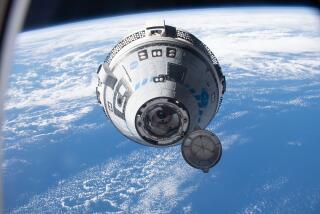U.S. Funds May Help Russians Build Spacecraft
- Share via
MOSCOW — NASA and the Russian space agency are discussing possible U.S. funding of Russian spacecraft in order to head off the risk that the orbiting international space station will need to be left without a crew, Russian and American space officials said Tuesday.
A U.S. law intended to pressure Russia to cut back on cooperation with Iran in the field of nuclear power currently blocks such a space-vehicle deal, but ways to overcome that obstacle are being examined, the officials said.
With the loss of the space shuttle Columbia leading to the grounding of the U.S. shuttle fleet for an indefinite period, Russia’s Progress cargo craft and three-person Soyuz space vehicles are the only available ways to carry supplies to the station or ferry crews back and forth. Russian officials have said that they do not have enough of either type of vehicle to meet the station’s needs.
While the orbital outpost could be left for a period of time without a crew, it is possible it could be lost if something went wrong while no one was on board, according to U.S. and Russian officials.
“Last week when our deputy director Nikolai Moiseyev was visiting the United States, our colleagues from NASA approached him with a request to establish whether a new Progress ship can be built this year and how much it would cost,” Sergei A. Gorbunov, spokesman for the Russian Aviation and Space Agency, said in an interview with the Los Angeles Times on Tuesday. “We are expected to give them the answer within two weeks.”
Despite NASA’s interest, “no assurances or promises of funding have yet been made,” Gorbunov said.
Don Savage, a NASA spokesman, said he could not confirm specific details, but said that NASA is holding discussions with a number of countries to develop a backup plan for the space station.
“There are ongoing discussions with all of the international space station partners on the next steps for continued operation of the station,” he said. “Of course, we are working closely with the Russian Aviation and Space Agency, given their unique capability to provide Progress supply missions to the space station. Our discussions are ongoing.”
Meanwhile, a Russian Progress M-47 cargo ship that docked last week at the international space station fired its thrusters Tuesday to push the station to a higher orbit. The action raised the orbit by 6.5 miles, to about 246 miles, Russian Mission Control spokesman Valery Lyndin said.
Such maneuvers either by a U.S. shuttle or a Russian vehicle are required periodically to prevent the station from falling back to Earth. Plans originally called for the orbit adjustment that was achieved Tuesday to be carried out in March by a shuttle mission.
The Progress ship is used primarily to bring fuel, food and scientific equipment to the station, which is a joint project of the U.S., Russia, Japan, Canada and the European Space Agency.
Russia is committed to send two Soyuz and three Progress vessels to the station this year, but that would exhaust its available craft, officials say.
“It is already clear that the shuttle will not resume flights until next year,” Yuri Koptev, general director of the Russian space agency, said Tuesday. “In this case, we must launch not three but four Progress ships this year.”
Russia would want its partners to bear the extra cost, Koptev said. The cost of a Progress ship is estimated at $22 million.
Were the United States to start paying for the production of Russian space vehicles, it would give an important boost to both the finances and the prestige of the Russian program.
But a key obstacle to U.S. funding of Russian spacecraft in the wake of the shuttle disaster is the Iran Nonproliferation Act of 2000, which bars “extraordinary payments” to Russia’s space agency unless the United States confirms Russia has not transferred banned missile technology or technology for weapons of mass destruction to Iran in the previous year.
The Bush administration has repeatedly stressed its unhappiness about Russian cooperation with Iran on nuclear power, fearing this could help Tehran develop nuclear weapons. The CIA has also accused Russia of helping Iran develop long-range ballistic missiles.
Moscow denies that its activities help Iranian nuclear weapons or missile programs.
James Newman, NASA’s coordinator in Russia, said at a Moscow news conference Tuesday that NASA cannot now pay for construction of any extra Russian space vehicles because of the legislation.
Gorbunov said the law is an obstacle but that there might be a loophole in case of an emergency.
Newman said “of course it’s possible” the space station could be left empty for some time, but that this is not an attractive option. “The question is how long until a failure occurs that would cause the space station to be unreturnable to,” he said.
“When you leave your house for a vacation, sometimes you turn off the water, you turn the lights down, you turn off electricity,” he added. “When you come back it doesn’t seem quite the same. Funny smell. You want to inhabit your house to keep it fixed and in operating mode. The same thing is obviously true of the space station.”
Newman, a former astronaut, also put in a plug for continuation of human spaceflight despite the risks and expense.
“The one thing that a human spaceflight program can do and a nonmanned spaceflight program cannot do is ensure survival of the species,” Newman said. “Single-planet species do not survive.”
*
Times staff writer Ricardo Alonso-Zaldivar, in Washington, contributed to this report.
More to Read
Sign up for Essential California
The most important California stories and recommendations in your inbox every morning.
You may occasionally receive promotional content from the Los Angeles Times.













